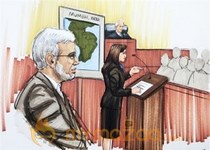Putting Islamabad squarely in the dock, Pakistani American terror suspect David Coleman Headley has testified that he dealt with senior government officials and terrorists in Pakistan a month before the November 2008 Mumbai attack, the three-day siege of India’s financial capital he said he was “pleased” with.
The revelation by the prosecution’s star witness on the second day of the trial of Headley’s one-time friend Pakistan-born Canadian Tahawwur Rana in a Chicago court has added fuel to demands here for stopping US aid to an unreliable ally in the fight against terrorism.
Headley said Tuesday that he learned about the attacks in Mumbai through a text message telling him to turn on the TV.
Asked by prosecutor Daniel Collins what he thought about the news coverage, Headley said in a monotone: “I was pleased.”
Federal prosecutors Tuesday also established Rana and Headley’s long-time friendship with the consul general for Pakistan in Chicago. All three men attended the same top military school in Pakistan.
Headley, who spent time in scouting for targets for the Nov 26-28 terror strike, also detailed his relationship with his handler, identified only as Major Iqbal from Pakistan’s Inter-Services Intelligence (ISI).
Describing his last several months in Mumbai, Headley said he received the final orders from Major Iqbal, who was apparently upset that the Mumbai airport was not being considered as a possible target by the attackers.
According to the testimony, Iqbal wanted Headley to scout the Indian Naval Air Station in Mumbai as well. “He was really keen on that,” he said.
He said he was asked to conduct surveillance and mark on his GPS the location of the Chabad house, a Jewish community centre in Mumbai. Major Iqbal, he said, was interested in attacking the Chabad House since he believed it was allegedly a front for the Mossad, Israel’s intelligence service.
Headley revealed that the terrorists had unsuccessfully tried to carry out the attack in September but crashed their boat while leaving Pakistan.
The US-born son of a Pakistani father and an American mother, Headley had changed his given name of Daood Gilani in 2006 to scout targets for the Mumbai attack without arousing suspicion.
Giving vivid details of the terror plot he enlisted Rana to help carry out, Headley said he was recruited by Lashkar-e-Taiba (LeT) leader Hafiz Saeed to take part in the plot to attack Mumbai.
He also described how he received instructions to shoot surveillance films for the attackers to help them plan their routes.
In September 2008, Headley said the planners for the attacks decided they would use what he called a “stronghold option” to barricade themselves in the hotels and fight to the death instead of trying to escape from Mumbai.
Headley testified that when he met Rana in Chicago on his return to the US Dec 8, 2008, they discussed the attacks, in which 166 people were killed, including six Americans.
“I said to him, ‘Now we’re even with India’,” Headley said. To which Rana apparently responded, “They deserved it.”
Headley also claimed he told Rana all about the terrorist attack plot five months before it was carried out, including a strategy of shooting hostages to prevent any struggles and then beheading them later, to which Rana replied, “Good”.
Rana, 50, even met in Dubai Abdur Rehman Hashim Syed, also known as “Pasha”, a retired Pakistani Army major tied to the bombings, weeks before the attack, Headley said in response to a question from Collins.
Headley said he frequently exchanged emails with the ISI and the LeT.
He also gave details of how he was recruited by an ISI member to take part in the Mumbai plot.
Headley said he met with both his handlers from LeT and ISI in Pakistan in October 2008 – one month before the Mumbai rampage.
Headley’s revelations have further strained the US’ relationship with Pakistan amid mounting pressure from the Congress to reduce foreign aid after the May 2 US raid on Al Qaeda leader Osama bin Laden’s hideout in Abbottabad, not far from the Pakistani capital Islamabad.







